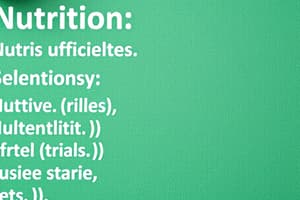Podcast
Questions and Answers
What is the scientific definition of food?
What is the scientific definition of food?
Any substance that you consume that provides the nutrients necessary in order to sustain life.
What is the legal definition of food?
What is the legal definition of food?
Can be processed, partially processed, or unprocessed for consumption that are meant to be ingested by humans; any substance included in the manufacturing process.
What are processed foods?
What are processed foods?
Components of a particular part of that food can be removed during its development.
What are nutrients?
What are nutrients?
What is the main energy yielding nutrient?
What is the main energy yielding nutrient?
What are the most energy dense nutrients?
What are the most energy dense nutrients?
What are proteins composed of?
What are proteins composed of?
What are essential nutrients?
What are essential nutrients?
What are zoochemicals?
What are zoochemicals?
What are phytochemicals?
What are phytochemicals?
What are nonessential nutrients?
What are nonessential nutrients?
What are the six nutrient categories?
What are the six nutrient categories?
What are simple carbohydrates?
What are simple carbohydrates?
What are complex carbohydrates?
What are complex carbohydrates?
What are lipids?
What are lipids?
What are trans fats?
What are trans fats?
What are unsaturated fats?
What are unsaturated fats?
What do phospholipids do?
What do phospholipids do?
What are vitamins?
What are vitamins?
What are micronutrients?
What are micronutrients?
What are macronutrients?
What are macronutrients?
What are energy yielding nutrients?
What are energy yielding nutrients?
What are inorganic nutrients?
What are inorganic nutrients?
What are organic nutrients?
What are organic nutrients?
Is alcohol considered a nutrient?
Is alcohol considered a nutrient?
What three elements make up carbohydrates, proteins, and lipids?
What three elements make up carbohydrates, proteins, and lipids?
Are proteins the only macronutrients that contain nitrogen?
Are proteins the only macronutrients that contain nitrogen?
What are the functions of nutrients in the body?
What are the functions of nutrients in the body?
What do nutrient profiles represent?
What do nutrient profiles represent?
Flashcards are hidden until you start studying
Study Notes
Food Definitions
- Food, scientifically defined, is any substance consumed to provide necessary nutrients for sustaining life.
- Legally, food includes processed, partially processed, or unprocessed substances intended for human consumption, covering items like beverages and chewing gum.
Processed Foods
- Processed foods have components removed during development for preservation or enhancement.
Nutrients Overview
- Nutrients are chemical substances in food or beverages that provide energy and support health.
- Essential nutrients, like Vitamin C, must be obtained through diet as the body cannot produce them.
- Nonessential nutrients are important but can be synthesized by the body in varying amounts.
Nutrient Categories
- There are six primary nutrient categories: carbohydrates, proteins, lipids, water, vitamins, and minerals.
Carbohydrates
- Carbohydrates are the main energy-yielding nutrients, comprising starches and sugars.
- Simple carbohydrates include monosaccharides and disaccharides, which can form complex sugars.
- Complex carbohydrates, or polysaccharides, consist of multiple glucose molecules linked through chemical bonds.
Proteins and Lipids
- Proteins are composed of amino acid chains connected by peptide bonds, serving as the second most energy-dense nutrient.
- Lipids, including fats, oils, and waxes, are energy-rich compounds made of carbon, hydrogen, and oxygen.
Specific Types of Lipids
- Trans fats are artificially created by adding hydrogen to vegetable oils to enhance shelf life.
- Unsaturated fats are liquid at room temperature and can be found in plant oils, nuts, and seeds.
- Phospholipids are crucial for cell structure and are commonly used in food products to keep oil and water from separating.
Vitamins and Micronutrients
- Vitamins assist in regulating digestion, absorption, and metabolism of other nutrients.
- Micronutrients, like vitamins B, C, and D, and minerals such as iron and calcium, are required in smaller amounts.
- Macronutrients, which include carbohydrates, lipids, proteins, and water, are needed in larger quantities.
Energy and Nutrient Composition
- Energy-yielding nutrients break down to provide the body with usable energy; these include carbohydrates, fats, and proteins.
- Inorganic nutrients, such as minerals and water, lack carbon in their structure, while organic nutrients (carbohydrates, proteins, lipids, vitamins) contain carbon.
Nutrient Profiles and Functions
- Nutrient profiles describe the contribution of nutrients in standard units, like cups or ounces.
- Nutrients play vital roles in the body, including providing energy, building structures, and regulating processes.
Alcohol
- Alcohol provides energy (7 kcal/g) but is not classified as a nutrient.
Key Chemical Elements
- The three elements that compose macronutrients (carbohydrates, proteins, lipids) are carbon, hydrogen, and oxygen.
- Proteins are unique among macronutrients as they contain nitrogen in their structure.
Studying That Suits You
Use AI to generate personalized quizzes and flashcards to suit your learning preferences.



